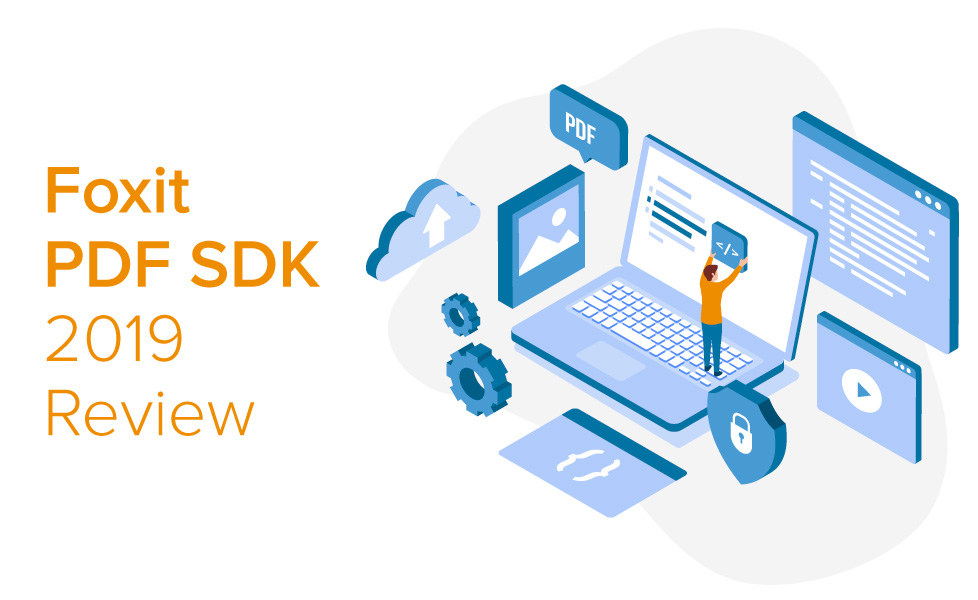Foxit PDF SDK’s 2019 Review

2019 has been the busiest year yet for the Foxit PDF SDK team! In this blog we take a look at some of the major upgrades we’ve made to our SDK this year in case you missed it.
Contents
XFA Improvements
We’ve listened to what our customers have said and have taken big steps to improve XFA form functionality this year.
One of the first actions we took was to add XFA support for our mobile PDF library where you can now read and fill forms at the UI level.
We’ve added support for the following XFA features:
- Recognize and add signatures to existing signature fields of an XFA form
- Additional properties of XFA fields and the name of XFA widgets
- Ability to add features to execute through XFA fields
- Get field name, field type, and field position
- Ability to flatten XFA documents
- Check on/off status of edges (top, left, right, bottom) and corners for XFA form fields
- Get tooltip info, alignment and justification and tab order for XFA form fields
PAdES & LTV Signatures
This year we added support for PAdES standard signatures. This means you can add, sign and verify PDF documents that confirm to PDF Advanced Electronic Signature Profiles. This has big implications for your archive and compliance efforts. The improvements we made to the PAdES ensures that customers no longer need to link third-party libraries, giving you more choice than ever when experimenting with our PDF SDK.
Long-term validation (LTV) of signatures means that a signature can still be validated if the certificate has expired or has been revoked. It makes it possible for signatures and certificates to remain valid for many years after being signed. This is important for long-term document preservation which we wrote about previously.
Currently, the supported level of PAdES profiles provided by Foxit PDF SDK is:
- PAdES B: Basic Signature – PKCS#7 signature (adbe.pkcs7.detached) with an optional timestamp and OCSP revocation as defined by the ISO-3200 PDF 1.7 Standard.
- PAdES BES: Basic Enhanced Signatures – CAdES Signature (ETSI.CAdES.detached) with additional protection and optional signature timestamps.
- PAdES EPES: Explicit Policy Enhanced Signatures – CAdES Signature (ETSI.CAdES.detached) with added signature-policy-identifier attribute.
- PAdES LTV: Long-Term Validation – CAdES Signature (ETSI.CAdES.detached) with added document timestamps, CA certificates and OCSP revocation applied to the PDF on time of signing. Additional validation data and timestamps can be applied to the signature for long-term validation.
PDF/A Compliance
Midway through the year we added a PDF/A Compliance feature to PDF SDK. We provide APIs to convert a PDF to be compliant with PDF/A standards or verify whether a PDF is compliant with PDF/A. It supports all PDF/A versions and can convert at industry-leading speeds whether on a server or end user application.
Our PDF/A Compliance addon enables you to convert PDF files to PDF/A compliant formats and validate those PDF files for compliance within the entire PDF/A range standard (PDF/A-1a, PDF/A-1b, PDF/A-2a PDF/A-2b, PDF/A-2u, PDF/A-3a PDF/A-3b and PDF/A-3u), as well as fix and normalize files.
Major improvements to our Web-based JavaScript viewer
2019 saw PDF SDK for Web become part of our single core API. This means that you can develop applications in the same way as our desktop and mobile SDKs so long as you know JavaScript. Our PDF SDK for Web UI is now responsive and fully customizable within the UI extension. We now offer the fastest performing Web SDK on the market, so whether you prefer to render your documents on your servers, or in your users’ devices, your documents will render faster than ever before with our performance enhancements. As noted above, during the year we added official support for AngularJS as well as touchscreen capabilities and much more.
We also had a major overhaul of API functionality for PDF SDK for Web; you can now add and edit bookmarks and form fields, use new layout modes including single, facing, cover facing, and continuous cover facing as well as support for PDF encryption by the FileOpen plugin.
.NET Core support
The same functionality already available on other PDF SDK platforms became available on .NET Core. The open source framework is ideal for those who develop apps on Windows, Linux, and Mac operating systems. With its high-performance and scalable system, .NET Core is the future of the .NET framework and you can now develop your apps in .NET Core with PDF SDK.
The next step for Foxit PDF SDK for .NET Core is the upgrade to .NET Core 3 and support for Windows Form Applications. We are committed to following the roadmap for the Microsoft framework to help our customers migrate easily. Microsoft has recently announced that .NET 5 will be available in 2020. .NET 5 is set to replace .NET Core with its main goal to surpass and consume .NET Framework and .NET Core in the future. Click here to view our .NET Core guide.
New Plugins Added and Enhanced
This year kicked off with a plugin frenzy for the Foxit team with official support added for Flutter, AngularJS, Kotlin, React Native, and Xamarin.
Our releases earlier in 2019 provided additional APIs for React Native, Xamarin and Cordova plugins to support the FSForm interface. Cordova users also got new JavaScript APIs to import/export annotation data to XFDF, enable/disable annotations, change the UI for PDF viewing controls, and other form-related APIs.
Our final update of the year synchronizes all of the plugin updates to the latest version of Foxit PDF SDK for Xamarin, Cordova, React Native, Kotlin, and Flutter.
This year has been busy and 2020 is going to be no different for the Foxit SDK team. Get in touch with us below for more information on what’s coming and watch this space.

